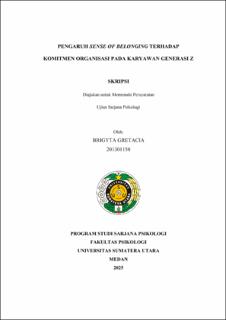Pengaruh Sense of Belonging terhadap Komitmen Organisasi pada Karyawan Generasi Z
The Influence of Sense of Belonging on Organizational Commitment in Generation Z Employees
Abstract
This study aims to determine the influence of sense of belonging on organizational commitment in Generation Z employees. This study used a quantitative research method with a correlational approach. The data collection method consisted of two scales, namely the Sense of Belonging Instrument (SOBI) by Hagerty and Patusky (1995) to measure sense of belonging and the Organizational Commitment Questionnaire (OCQ) Scale by Allen and Meyer (1990) to measure affective, continuance, and normative organizational commitment. The sampling technique used was a purposive sampling technique. The respondents consisted of 100 Generation Z employees. Data were analyzed using multivariate regression analysis. The results showed that (1) sense of belonging has a positive and significant effect on affective organizational commitment; (2) sense of belonging has a positive and significant effect on organizational commitment; (3) sense of belonging has a positive and significant effect on normative organizational commitment among Generation Z employees. These findings indicate that the higher the level of employee’s sense of belonging, the higher the employee's organizational commitment in the workplace.
Collections
- Undergraduate Theses [1451]

